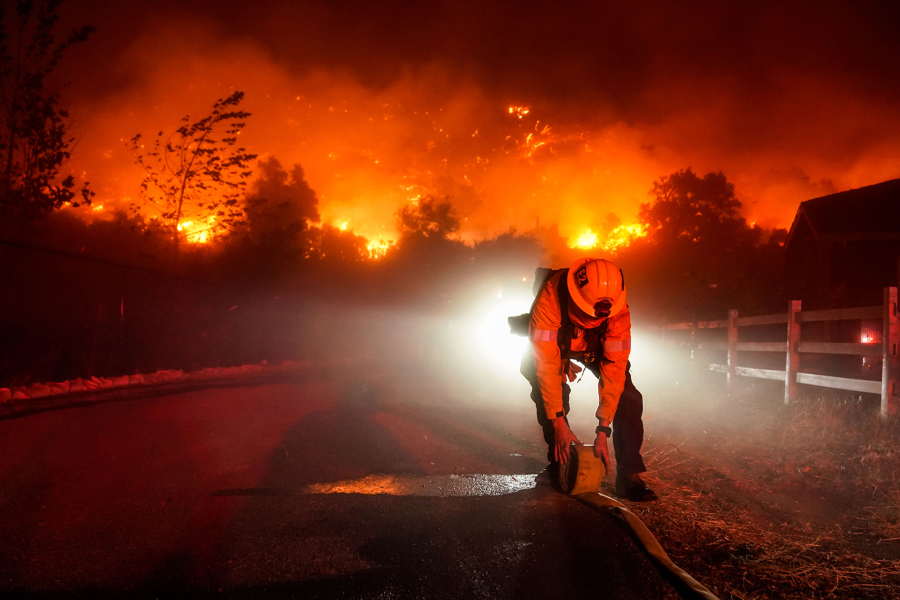Nationwide and other big U.S. insurers are coming up short when it comes to tackling problems of climate change, biodiversity and human rights, according to a new report from a United Kingdom-based group.
Columbus-based Nationwide disputes the report’s findings and notes the work that it is doing in renewable energy and its efforts to cut emissions of carbon dioxide from its operations.
ShareAction, which describes itself as a finance watchdog group backed primarily by charitable groups such as the IKEA Foundation and the European Climate Foundation, says insurers are going against the global movement toward sustainability. It gave Nationwide and four other big U.S. insurers — AIG, Allstate, Genworth Financial and Protective Life Insurance — low rankings across categories on governance, climate change, biodiversity and human rights.
Nationwide ranks next to last among a group of 35 property and casualty insurers in the U.S., Europe and Asia.
The report also looks at big life and health insurers.
ShareAction based its report on answers to surveys submitted to the insurers and publicly available data.
Nationwide didn’t respond to ShareAction’s request for information. The insurer says it doesn’t participate in surveys like this from non-governmental organizations.
Its annual sustainability report does show what the insurer is doing when it comes to reducing emissions of carbon dioxide, reducing waste and its investments in areas such as sustainable farming.
“Nationwide has a long-held commitment to corporate sustainability. We are recognized as a leading advocate for diversity, equity and inclusion in our community and in our industry,” the insurer said in a statement. “We have made substantial investments of more than $1 billion in renewable energy efforts and $3.5 billion in affordable housing. We take responsible investing seriously and embed environment, social and governance factors in our investment approach. We are proud of our record and history on sustainability issues, and we remain committed.”
ShareAction said it reviewed Nationwide’s sustainability and annual reports as part of its research.
“Practically nothing there in terms of the management of the massive systemic risks from climate change, biodiversity and human rights to their investment and underwriting activities,” said Felix Nagrawala, the report’s author.
The report shows European insurers are ahead of their U.S. and Asian counterparts, something that Nagrawala said is the result of more emphasis on these issues by European regulators.
“The U.S. insurance industry is burying its head in the sand as the rest of the world races to embrace a greener, cleaner and more equitable future,” Nagrawala said. “Despite the sector’s expertise in identifying, forecasting and managing risk, it continues to support companies responsible for climate change, including those engaged in coal, tar sands, and Arctic oil and gas.”
The report found U.S. insurers don’t do enough to assess the impact of climate change, such as the recent wildfires in the U.S. In 2020 alone, wildfires in California caused estimated insured losses of $8 billion.
When it comes to biodiversity, no U.S. or international insurers have set nature-related targets regarding deforestation, hazardous waste or water use, according to the report.
The report also found that no U.S. insurer has a policy to exclude investment in companies that are knowingly in breach of human and labor rights.
The ShareAction report comes amid growing calls for companies to do more to address climate change as the costs from wildfires, tornadoes and other storms continues to grow. More and more companies are pledging to cut their emissions of carbon dioxide, for example.
A report by professional services firm Aon identified 416 natural catastrophe events in 2020 around the world that resulted in losses of $268 billion. Of that total, $97 billion was covered by private sector and government-sponsored insurance.
The Insurance Information Institute, an industry group, has been working with its member insurers to better understand the issues of climate change and other risks and, in turn, helping their customers prevent losses and mitigate damage, said Sean Kevelighan, the group’s CEO.
“Insurers have been dealing with climate risk for a very long time,” he said.
Insurance companies can’t decide where people build and live, but they can get them to understand the risks of that and price that risk accordingly, he said.
“Let’s get people to think about risk when they purchase property,” he said.
Insurers also work with their business customers to identify their potential liabilities from their operations, he said.
While insurers do hold investments in energy companies, they are shifting to alternatives, he said.
The industry remains highly regulated with all states have insurance regulators that keep tabs on companies, he said.
“These are issues that were working hard to elevate in the industry,” Kevelighan said.



